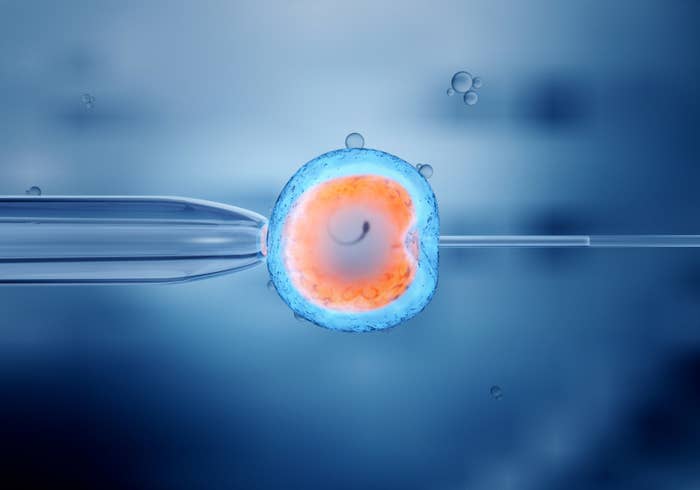
Lulu and Nana, the newly announced Chinese twin girls whose genes were edited to thwart HIV, face unknown and possibly dangerous health effects from unintended, or “off-target,” damage to their DNA, experts told BuzzFeed News.
“That is the big concern for the twins,” said Eric Topol of the Scripps Research Translational Institute.
Late on Sunday, Jiankui He of China’s Southern University of Science and Technology announced that he and bioengineer Michael Deem of Rice University had edited the genes of the twin girls when they were new embryos. After the controversial experiments were reported by MIT Technology Review, He confirmed the news in YouTube videos and an Associated Press story.
The news prompted a huge outcry from scientists and ethics experts overnight in the US and China, decrying the experiment as unauthorized, secretive, and dangerous. He’s university said it was investigating the experiment, which “seriously violated academic ethics and codes of conduct.” Rice made a similar statement on Monday, confirming that it was also investigating Deem.
The US National Academies of Sciences, Engineering, and Medicine, which is scheduled to host He for a talk on Wednesday at a Hong Kong summit, said it “remains to be determined” if the experiment, which gave the twins altered genes that could be inherited by their offspring, was conducted ethically. Chinese scientists denounced the experiment in a separate response.
He said that he and his colleagues used the CRISPR gene-editing method to disable a gene called CCR5 while the twins were 3- to 5-day-old embryos, in a bid to make them immune from HIV. (Their father is infected by the virus, according to He, and wanted to prevent susceptibility in the children.) CCR5 was partly chosen because disabling it requires only the removal, not the addition, of a few parts of the gene — replicating a genetic variation found naturally in millions of people worldwide. “The gene surgery worked,” He said in a video released on Sunday announcing the birth of the twins. “No genes were changed except the one to prevent HIV infection.”
Other medical experts, however, expressed doubts about this, particularly since the news reports indicated that only one of the twins had the CCR5 changes in both sets of genes, while the other hadn’t. That pointed to less than perfect precision of the CRISPR process.
One of CRISPR’s pioneers, Feng Zhang of the Broad Institute, said in a statement, “At this stage, the risks of editing embryos to knock out CCR5 seem to outweigh the potential benefits,” echoing concerns from other scientists.
Invented in the last decade, CRISPR is a famously precise method for editing genes in animals. But in recent years, experiments have found “off-target” effects from the technology — where genes besides the intended ones are altered — in human cells. In 2015, Chinese researchers from Sun Yat-sen University in Guangzhou reported that only a fraction of dozens of human embryos that had been gene-edited with CRISPR lacked off-target gene alterations. And in June, a pair of studies in the journal Nature Biotechnology jarred the gene-editing world by finding CRISPR off-target effects could damage a gene that protected people from cancer in both eye cells and the stem cells that the body uses to repair injuries.
A more recent study in mice found off-target mutations, particularly in the liver, with “very high frequencies” from inappropriately designed CRISPR interventions, but few if any problems in properly designed experiments.
"The CRISPR community is making great strides, but we still aren't anyplace near where I can give you 100% confidence that something targeting a gene won't target some other gene," CRISPR expert David Taylor of the University of Texas, Austin, told BuzzFeed News. Without the twins results being published there is now way to verify if intended or unintended changes were made. The rate of unintended effects in lab experiments is "all over the place," he added, sometimes frequent and sometimes rare.
“The accuracy of the CRISPR gene editing technology and the off-target effects it brings are very controversial,” more than 100 Chinese scientists said in their statement denouncing the experiments. Even if the twins are healthy now, they said introducing their potentially harmful genetic changes into the gene pool was “crazy.”
Overall, the scant data presented by He’s team so far doesn’t prove anything about the extent of off-target effects from CRISPR, or even if the CCR5 gene alteration worked, Topol said. “As far as we know, Lulu and Nana might be sitting out there with a off-target effects of all kinds.”
Partly for that reason, Sean Tipton of the American Society for Reproductive Medicine, a US fertility industry group, said that domestic fertility clinics would never approve CRISPR’s use this way, calling it reckless and unethical. “It’s way too soon to be doing this kind of human research.”
Ironically for a researcher facing investigation and outcry from many other scientists, He produced his own set of CRISPR ethics principles this week. Among them was that gene editing should only be done for disease prevention, not for the “vanity” of sex selection or appearance or performance genes.
“I understand my work will be controversial,” said He in one of his study videos. “But I believe families need this technology.”
UPDATE
This post has been updated with comment from David Taylor of the University of Texas, Austin.
